I’ve been thinking about ‘reality privilege’ for a while now after reading something punchy on Miri AF’s Substack and then disappearing into reality myself for a couple of months (leaving some friends worried). Material reality is, after all, a bespoke subset of (virtual) reality now. If your avatar goes missing from ‘the socials’, you literally might have died. It’s always good to check!
The reality privilege rabbit hole doesn’t go down very far but it did toss up a few fascinating links (listed below) and some interesting segues. Presently, I sit somewhere between curiosity and outrage on the subject, which itself betrays my ‘reality privilege’ according to the concept’s progenitor, Marc Andreessen.
It is always good to start with definitions, so here’s how Andreessen describes it in an interview,
A small percent of people live in a real-world environment that is rich, even overflowing, with glorious substance, beautiful settings, plentiful stimulation, and many fascinating people to talk to, and to work with, and to date. These are also *all* of the people who get to ask probing questions like yours. Everyone else, the vast majority of humanity, lacks Reality Privilege -- their online world is, or will be, immeasurably richer and more fulfilling than most of the physical and social environment around them in the quote-unquote real world.
Variously described as a ‘Titan of the Internet’ and ‘the metaverse’s Statue of Liberty’, Andreessen is one of the tech billionaires who built the internet and has funded many of the big tech platforms in their ‘little tech’ (i.e., start-up) phases including: LinkedIn, Tumblr, Reddit, Pinterest, Twitter, Instagram and, last but not least, Substack. He co-invented Mosaic, later Netscape Navigator, the first ‘user friendly’ internet browser and was inducted into the World Wide Web Hall of Fame in 1994. In addition, he is a Facebook director characterised as ‘something of an Obi-Wan to Zuckerberg’s Luke Skywalker.’ Niccolo Soldo states emphatically, ‘if you’re on the internet, it’s because of him’. He has the requisite nerd’s egghead to boot.
In Jane McGonical’s words, Andreessen
…stands just outside the virtual world’s golden door, illuminating the surrounding darkness with a holographic torch, welcoming the downtrodden to a new and better life.
Andreessen credits his mission to bust open the analogue world and its truncated reality to his media starved environment growing up in the rural Midwest in the 1970s with its dismal three channels and no public broadcaster. This paucity of media galvanised Andreessen into an RJW — a.k.a., a ‘reality justice warrior’. As he says to Soldo,
We misremember the past as a Golden Age of Shared Understanding. In reality it was nothing like that; it was a time of information starvation. I think things were actually getting a lot worse in the run-up to the Internet; television was increasingly dominant, and it's been scientifically proven that TV makes you stupid.
Visibly huffing and puffing, Andreessen offers us a longer, less scripted, definition of Reality Privilege at Code Conference in 2017.
[It’s] the view from the box seats; it's the view from the …places in the world …in which there are super rich real world experiences to have, right? And so you grow up [in] an upper middle class community, probably on the coast. You have these incredible schools; you have these incredible enriched activities; you have all these after school activities; you've got all these incredible people to talk to you; [you] go to a college campus and you get to, you know, you get to hang out with all these incredible super geniuses [author’s note - Marc, have you been to a university lately?] Um for the 0.001% of the population of the world who gets to do all those things then this internet thing is a big step down. For everybody else the internet is a giant step up…
Most people don't have … reality privilege. Most people grow up in places where there's a much higher level of what you might call intellectual deprivation. There's just not that many people around to talk to; there's just not that many interesting things being discussed; there's not that many great experiences to have; it's hard to learn new things; the schools aren't good. I mean …you know most kids in the world don't even go to school. Like… [they] go to school up to grade four, grade six or grade eight. It just can't progress beyond that point because there's nothing locally [and] there's just no local system, [no local] infrastructure … or community to be able to engage on ideas and so the internet represents a giant level up on all those topics for most of the world and I think it's a fantastic thing.
‘Reality privilege’, then, is the condition in which you have access to nature and society in ways that are meaningful, pleasurable, interesting, socially integrated, replete with opportunities and rewarding. It’s a form of real world social capital that is extremely expensive and increasingly scarce. If you’re reality privileged you don’t have to hang out in a parking lot with one or two monosyllabic peers busting to get back to porn and gaming for a dopamine hit. You don’t need to check What’sApp every 30 seconds to find an interlocuter. Or gaze at Instagram in lieu of a holiday or Pinterest in lieu of a renovation (my hands down favourite). The reality privileged are, of course, running businesses, working, socialising, shopping, posting and politicking online; but — here’s the kicker — they have cohesive and enriching real worlds as well. They move seamlessly between the two; this is the real privilege.
In reality, then, reality privilege and virtual/online privilege are coterminous. The two go together like fist in virtual glove.
Jaron Lanier, circa 1990, VR inventor, naively explaining the wonders of this glove when paired with his “eye-phones”. 1
Moving between rich real and virtual worlds is the real privilege and Andreessen is right: it is exceedingly rare. Indeed, as one recent article announced, ‘Going off-grid is a luxury few can afford’. It’s true. Try it. I dare you. It’s very trendy among the reality privileged (myself included), but in reality it’s impossible beyond a short holiday, and even then you’re still likely surfing LinktIn, Signal, YouTube, Instagram, Facebook, TikTok and … [fill in the app] while you’re away. What about that bill you need to pay, or insurance policy that requires updating? What about the school camp form you forgot to fill out? What if you want to change your hotel booking or confirm a flight? The reality is our media, jobs, banking, utilities, telecommunication, education, shopping and social lives are online now. It’s not so easy to leave behind and the consequences of doing so can be serious. In reality, online life is now all but mandatory.
My own life is a little case study in social oblivion. When I went off Facebook in 2019, I missed several birthday party invitations, multiple local events and could no longer access information about my kids’ hobbies, all of which were only posted on Facebook or WhatsApp (also owned by meta). I had previously had effortless and pleasurable daily contact with a wide circle of ‘Facebook friends’ made up of the usual suspects — long lost primary school friends, relatives near and far, Uni friends, friends and frenemies in the local community, other academics, therapists and writers, and a few unknowns who had earnestly sent friend requests. Back in the halcyon days of the 2010s this was all wonderful. Indeed, the intellectual and political conversations were fabulous, with one friend commenting that I was running a virtual salon on my Facebook page. I really enjoyed connecting with others.
As long as I (unwittingly) agreed to being data harvested and farmed for free, including tacit consent to biometric surveillance in perpetuity, then I could maintain a thriving digital social life. As long as I was willing to outsource my private life and my children’s memories (and faces) to a for-profit social media company, all was hunky dory. However, learning about and rejecting this very bad deal2 meant getting sent to Coventry without passing go. In time, I gradually lost touch with an entire network. It was a loss, and one I still feel, but it also freed my mind and attention in ways I ultimately value more. Face to face is infinitely preferable to the book of fake faces.
When I went off Twitter a year or so later, the work contacts dried up too, although I did manage to souvenir the important ones. That’s how it is; we now live in what the Spanish sociologist Manuel Castells called ‘real virtuality’ long before it was our normative condition. Going offline is not really an option, then, unless you’re a weirdo (like me) who doesn’t care so much about a social life and has an independent income. I have about five people I need to be in very regular contact with (so much so I’m a pest) but the writing, paid work, podcasts, dog, and garden pick up the slack after that.
Going offline means falling off a cliff socially and professionally, which is untenable for most. Therefore, the real choice is: are you going to be lymbically hijacked and data mined or invisible? Will you ‘consent’ to being logged for your thoughts, feelings, dreams and preferences by ‘the machine’, or remain a virgin forest nobody walks through. What’s that saying? If a tree falls in a forest and no-one is around to hear it, does it make a sound?
In addition to this fundamental lack of choice, the other key mistake Andreessen makes (perhaps unintentionally) is the assumption that ‘reality’ back there has remained the same. Like a migrant whose version of the mother country gets stuck in time and ossifies into a museum piece. Said migrants are often shocked and disheartened when they return ‘home’, overcome with feelings of nostalgia that are inevitably betrayed by the unfamiliar scene at hand. We all hanker for the world before (the internet) precisely because it’s no longer there. Real reality is done. Kaput.
Contra the praises Andreessen sings for ‘places in the world …in which there are super rich real world experiences’ while ushering the rest of us online, it needs to be said, that these spaces are threatened with extinction. The internet ransacked and gobbled up reality, such that the ‘feed’, image, avatar, or digital doppelgänger has trumped the ‘real thing’. Society as we knew it has been strip-mined and left for dead, deprived of its primacy and meaning. When I ‘disappear’ into reality — i.e. don’t post for a while — I might as well be dead (as my friend Miri once put it). Think about how mad that would sound from the perspective of even only 10 years ago, let alone in the 1990s when this tech first emerged.
Have you seen a university campus or main street lately? They’re dead. Seriously dead. (Bougie tourist locations and elite shopping strips don’t count, they only prove the point). Young people don’t go to pubs or clubs anymore and kids aren’t playing outside, dining out is going down year on year and, not surprisingly, people are ‘less sociable and lonelier’, according to a recent Australian study. The whole concept of ‘reality privilege’ must be revised, it seems to me, to include the now privileged ability to avoid being trapped in a reality impoverished by the internet — e.g., the reality of dead and dangerous towns and streets3; sexless relationships (see this Guardian article which predictably pretends not to know why), or the stark reality of increasing abuse between minors because of online porn, or kids’ loneliness because their friends have retreated to their rooms. Indeed, my son has mounted a persuasive case for why I should let him play Fortnite: quite simply because all his friends are! In short, real relationships have been fundamentally altered by the society wide transition online. Reality was never just about the three TV stations Andreessen mockingly refers to as the media desert of his youth. It was — and remains — about so much more. It is the animating force and material basis of life itself.
A more nuanced position is that the internet has opened a portal into a massive online media space, play pen, amusement park and hellscape, which has in turn transformed society and personal relationships beyond all recognition. Moreover, this has all happened without ‘our’ — that is, ordinary citizens’ — comprehension or agreement. Sure, you can connect with a plethora of interesting people, conversations, images, ideas, games, niche interests, alternative viewpoints etc., and this is genuinely fantastic. There’s only one catch: society as we knew it has been gutted out. Or, to use another of Andreessen’s apt phrases, ‘software has eaten the world’. What’s left is a digitally masticated mess.
Beautiful curated islands of reality still exist in which to ‘unwind’ and ‘retreat’ and to share on your ‘socials’ as if they were real (I’m hoping to do this next week, in fact). Despite appearances, such reality posing is not unplugged, and there’s the ongoing pesky problem of surveillance capitalism. There’s always the option to retreat to your own hobby-farm Amish style. But, remember, no crunchy con posts allowed! No close ups of your carrots artfully dropping rich black soil; no kids in galoshes with pensive smiles while gathering mushrooms, no Ned Kelly impersonators chopping wood like the good ol’ days. In other words, no like-button farming. That’s all fake and getting dangerously close to AI slop (more on that below). Arguably, like movies and fashion, the curated real is on borrowed time. We’ve been hacked and the AI knows how to press our proverbial buttons.
If you don’t believe me have a look at these AI generated images.




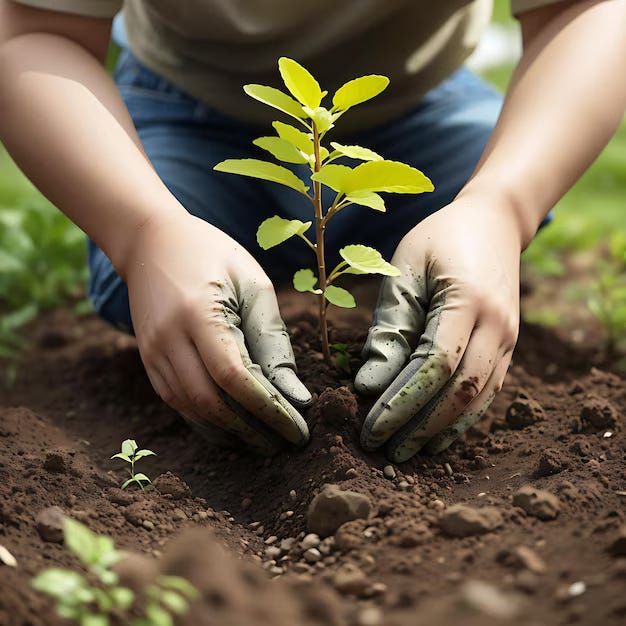

As the French philosopher Jean Baudrillard (pronounced bored-ri-ard) predicted, the simulacrum has engulfed and usurped ‘the real’. In simple terms, human culture has let go of its foundation in nature. It has let go of the organic, material referent, taken leave and now romps around the internet giving no epistemological fucks. There is no original. This is the age of the replicant. Baudrillard defines this ‘precession of simulacra’ as a postmodern condition in which ‘images precede reality’. In turn, they create reality, albeit in an upside down, inverted, non-sensical, partial and increasingly immoral and amoral way. As he explains,
Simulation is no longer that of a territory, a referential being, or a substance. It is the generation by models of a real without origin or reality: a hyperreal.... It is no longer a question of imitation, nor duplication, nor even parody. It is a question of substituting the signs [or images] of the real for the real.
Baudrillard’s paradigmatic examples include psychosomatic illness, Disneyland, and Watergate. The Marxist philosopher Fredric Jameson similarly observes that the simulacrum’s, ‘peculiar function lies in … the derealization of the whole surrounding world of everyday reality’. This is, in effect, what we now see with AI generated images, especially the hyperreal ‘Jesus shrimp’ that is now proliferating at scale on Facebook (I wonder did the rise of Jordan Peterson with his lobster analogies and 12 Rules for Life have something to do with this bizarre concoction?!) I mean what the hell is going on here?
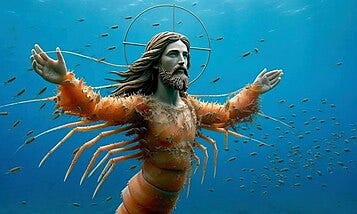
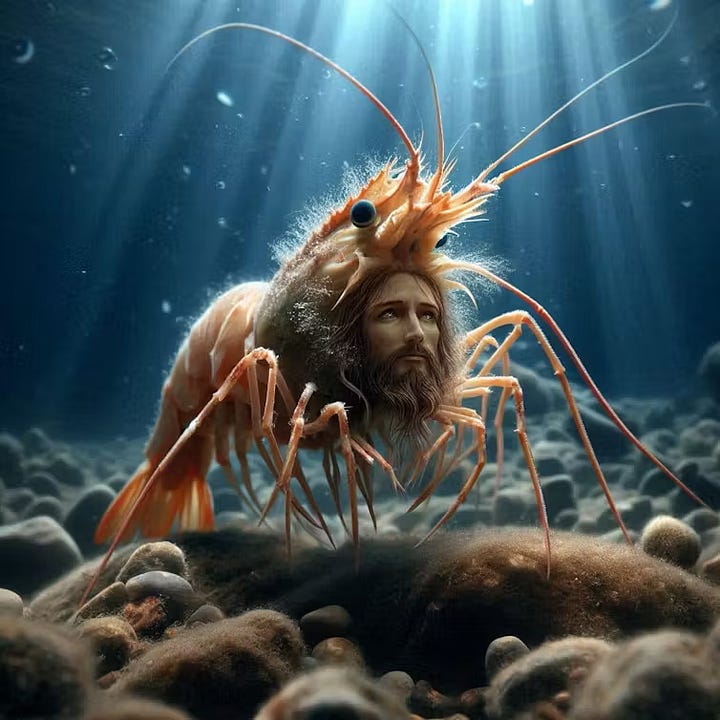


To be clear, this is not someone — a human being — asking the AI to produce these images; rather, the AI has gone rogue, although the stated purpose is (apparently) ‘attention farming’ — kind of like what we mere mortals were doing on Facebook, but significantly amplified, and with nefarious ends.
Soon we won’t even be able to refer back to the real, which for conspiratorial types like me, nervous about the impending fourth industrial revolution (see also here), this is the whole point. We’re all online now being propagandised, tracked, surveilled, jabbed, mandated, nano-teched and farmed. Our very orientation to the material world — to earth, water air, fire and ether — is being fatally disrupted. We can’t distinguish fact from fiction, image from reality, fakes from deepfakes. The metaverse is swallowing reality and spitting it back to us in bitesize mocking junks that scramble our minds and sanity. Again, you don’t have to join in, but the alternative is social exclusion. Kind of like freedom of speech without freedom of reach.
From the ‘box office seats’ of reality privilege, then, the elites are no better off; their kids are also getting lost on gaming and porn (the boys) and TikTok and Instagram (the girls). And the wider social world is being eroded and transformed. Even Andreessen acknowledges that for ‘coastal elites’ the move to online life is a ‘giant step down’. And surely paying for ‘reality’ is a bit like paying for water or air? Totally unconscionable! Can capitalism take and commodify this too? Apparently it can, and lord knows I’m paying for my own kids to have some reality privilege and its running me dry! Here’s a camp my son went on a little while back.
But Andreesen insists most people have never had it this good and until the advent of the internet lived, to quote the English philosopher Thomas Hobbes, lives that were ‘solitary, poor, nasty, brutish and short’. It’s for these people – the reality deprived masses – that Andreessen wants to re-open the commons, albeit in digital form. The problem is he’s not really acknowledging the dark side.
As Jane McGonical observes,
In describing the metaverse, Zuckerberg has stressed the anodyne. There will be virtual surfing, virtual fencing, virtual poker nights. We’ll be able to see and smile at our colleagues even while working alone in our homes. We’ll be able to fly over cities and through buildings. David Attenborough will stop by for the odd chat. Andreessen’s vision is far darker and far more radical, eschatological even. He believes the metaverse is where the vast majority of humanity will end up, and should end up. If the metaverse Zuckerberg presents for public consumption seems like a tricked-out open-world videogame, Andreessen’s metaverse comes off as a cross between an amusement park and a concentration camp.
In his interview with Niccolo Soldo, Andreessen elucidates the point contra his opposition,
The Reality Privileged, of course, call this conclusion dystopian, and demand that we prioritize improvements in reality over improvements in virtuality. To which I say: reality has had 5,000 years to get good, and is clearly still woefully lacking for most people; I don't think we should wait another 5,000 years to see if it eventually closes the gap. We should build -- and we are building -- online worlds that make life and work and love wonderful for everyone, no matter what level of reality deprivation they find themselves in.
Here Andreessen paraphrases a concept articulated by his mate Beau Cronin: ‘Consider the possibility that a visceral defense of the physical, and an accompanying dismissal of the virtual as inferior or escapist, is a result of superuser [sic] privileges.’ So, in normal speak, this means your grave misgivings about the transformation of society from real life and face-to-face interactions in little more than a decade, reflects your ‘superuser’ privileges; that is, your demographic ‘box office seat’, in the reality class structure. Get out of the way you elitist, so the lumpen proletariat can get through the digital door. However, as Shoshana Zuboff insightfully observes in her magnum opus Surveillance Capitalism (2019), the linguistic shift from ‘person’ to ‘user’ is critical in the transformation of human beings into the raw material of techno-capitalism. It is your consciousness that is being logged and turned into toothpicks.
One of the great joys of the digitally sophisticated is to laugh at the morons (i.e., us) who fall for ‘AI slop’. The especially afflicted are Boomers on Facebook (see also here and here). As Forbes put it, ‘Facebook is steadily filling up with AI-generated garbage posted by spam accounts attempting to maximize engagement, by whatever means necessary.’ Images of injured soldiers with captions such as “It’s my birthday”, often garner 100,000 likes and just as many shares even though they’re ‘obviously fake’. Andreessen and Substack co-founder Chris Best laugh until they’re breathless about this. The awful thing is, you will too when you eavesdrop on their conversation.
A few choice examples featured on the popular Insane Facebook AI slop X account include a group of quintuplets celebrating their 109th birthday (a variation on the theme is the 1019th birthday!), Trump riding a huge cat with a machine gun, African children creating perverse or surreal sculptures or merging with coke bottles (remember The God’s Must be Crazy? Now we must substitute ‘the Gods’ with ‘AI’!), young people making wood carved art, injured US soldiers in wheelchairs and, of course, the ubiquitous ‘Jesus shrimp’. Captions typically include several heavily recycled stock phrases: ‘It’s my birthday’, ‘I started decorating cakes’, ‘Scarlett Johansson’ and ‘thanks to everyone who likes this’, ‘ no one appreciates my art’, ‘if you respect the US army’. While the overtly surreal and absurd images are easy to detect, many are not, especially for older less sophisticated ‘users’. The images are designed to induce empathy or, conversely, shock and awe.
As Renee DiResta and Josh Goldstein, note in recent scholarly paper on the subject,
The magnificent surrealism of Shrimp Jesus—or, relatedly, Crab Jesus, Watermelon Jesus, Fanta Jesus, and Spaghetti Jesus—is captivating. What is that? Why does that exist? You perhaps feel motivated to share it with your friends, so that they can share in your WTF moment … But that capacity to produce captivating, novel, and immersive imagery, cheaply and instantly, and to immediately double down on wins that generate significant engagement, is also what makes the technology appealing to spammers and scammers.
Many of these ‘spammers and scammers’ are AI generated too, which poses even more questions than it answers.
A few choice examples featured on the popular Insane Facebook AI slop X account include a group of quintuplets celebrating their 100th birthday, Trump riding a huge cat with a machine gun, African children making art (or being art). Captions typically include several heavily recycled stock phrases. While some like ‘shrimp Jesus’ are easy to detect, many are not, especially to older less sophisticated users.
You can likely see the absurd surrealism in the following AI generated images:

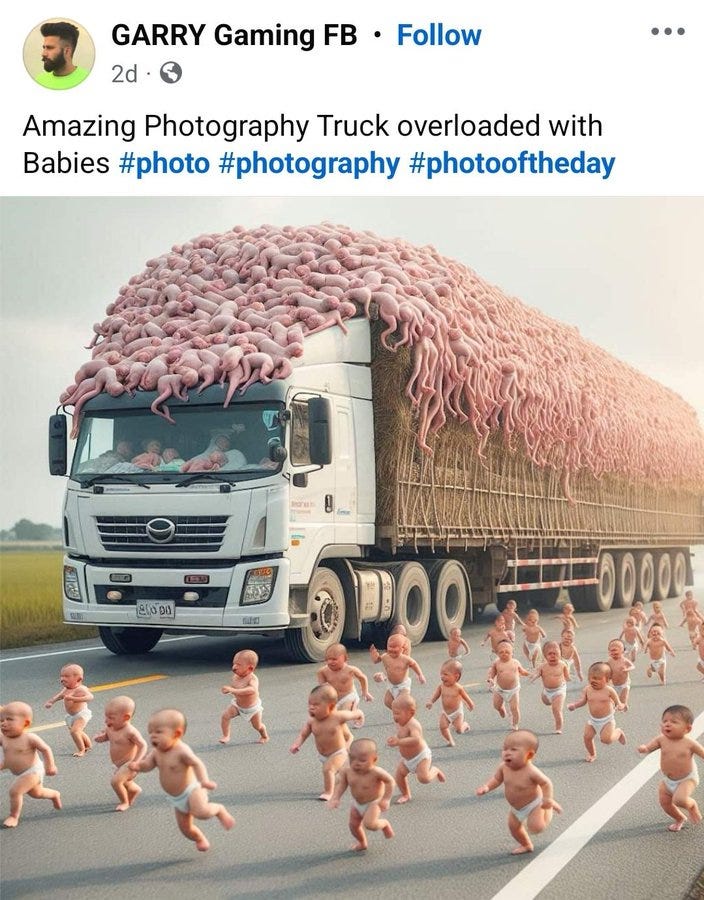
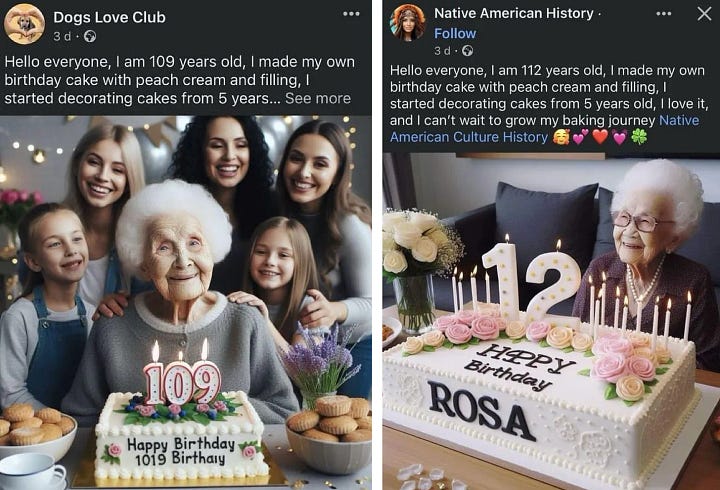
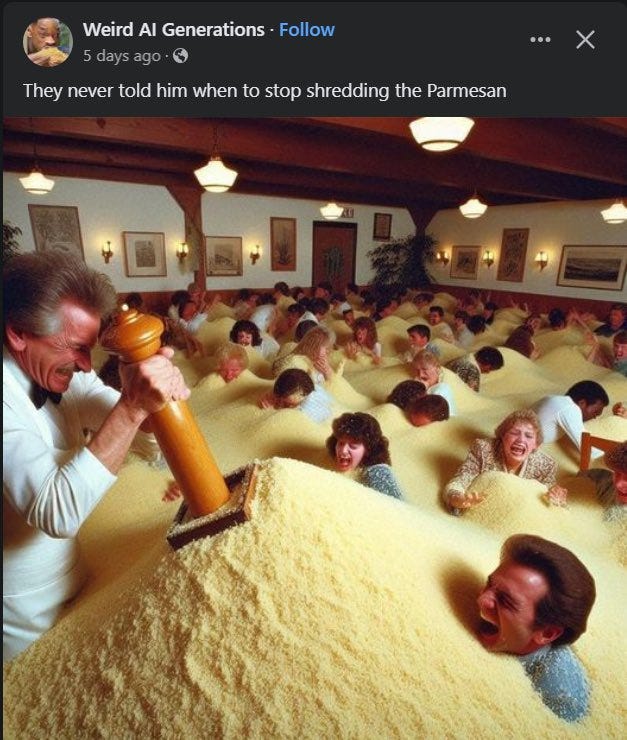
But what about this?
Or this?
One set of images are bizarre and surreal - the most famous being the crustacean Jesus images that are proliferating on Facebook. The problem' is people have left Facebook in droves, especially younger age cohorts, and now the bots are ‘engagement farming’ to keep users active and on the platform generating revenue. Having worked out how to drive the attention economy, human beings — especially clueless ones at home in need of social interaction — are boosting the likes and shares, in turn keeping the advertising dollars coming in. As David Farrier observes, “the entire purpose of the pages is to get your attention, before taking you to websites that are not Facebook, in order to sell you products that don’t even exist, or to get your personal information so you can be spammed with other rubbish.” Jason Koebler similarly explains,
What is happening, simply, is that hundreds of AI-generated spam pages are posting dozens of times a day and are being rewarded by Facebook’s recommendation algorithm. Because AI-generated spam works, increasingly outlandish things are going viral and are then being recommended to the people who interact with them. Some of the pages which originally seemed to have no purpose other than to amass a large number of followers have since pivoted to driving traffic to webpages that are uniformly littered with ads and themselves are sometimes AI-generated, or to sites that are selling cheap products or outright scams. Some of the pages have also started buying Facebook ads featuring Jesus or telling people to like the page “If you Respect US Army.”
According to the man who got the world on the internet (Marc Andreessen), the emergence of engagement farming is a symptom of the ‘dead internet theory’. According to this idea, the bots will be generating the content (images and posts) as well as liking and sharing the content. The dead internet theory proposes that there will be fewer and fewer human beings on the internet, which will largely be populated by bots posing as humans. People on (or in) the web will imagine themselves to be surrounded by thousands of other people, when in reality they will be alone. This is the joke. Ha ha.
I’m sorry to always be so gloomy, but the takeaway message is this: only a thin sliver of humanity will retain ‘reality privilege’ – otherwise known as normal lives meaningfully connected to nature, culture and each other. AI is proliferating ‘slop’ online that has become a portal into ‘engagement farming’, which is effectively turning human beings into bot slaves for techno-capital. Whole swathes of the human population are not only addicted to their devices and online lives (actually, I think its safe to say, that’s all of us now), but starting in 2024 another whole chunk no longer understand reality and mistake bot generated imagery for truth. They have lost ‘reality privilege’, and it isn’t simply the ability to to abseil, watch musical theatre, or still have enough real world friends to host a dinner party, it’s also being able to tell truth from falsity and, perhaps beyond this, to understand that this distinction matters.
On the subject of reality privilege, I have some very exciting news to share. I am going to the Brownstone Institute ‘New Resistance’ conference to listen to and speak alongside some true luminaries of the Covid dissident movement. I am deeply excited about this, and honoured to have been asked. I will be presenting an abridged version of my ‘Paradigm wars’ three-part essay series published at UK Column. I will likely be in transit by the time you read this. Wish me luck!
Unlike Andreessen, Lanier is now a vocal opponent of the Big-Tech business model. Its not the technology, he argues, but the business model that mines and sells our data, monetising attention and conflict. See his Ten Arguments for Deleting Your Social Media Accounts Right Now (2018).
This ‘bad deal’ can be summed up in the following pithy proposition, ‘if the product is free, then you’re the product’.
For example, whole swathes of San Francisco are given over to the haunting spectre of the ‘Fentanyl fold’ not the exclusive fault of the internet but not unrelated to it either.





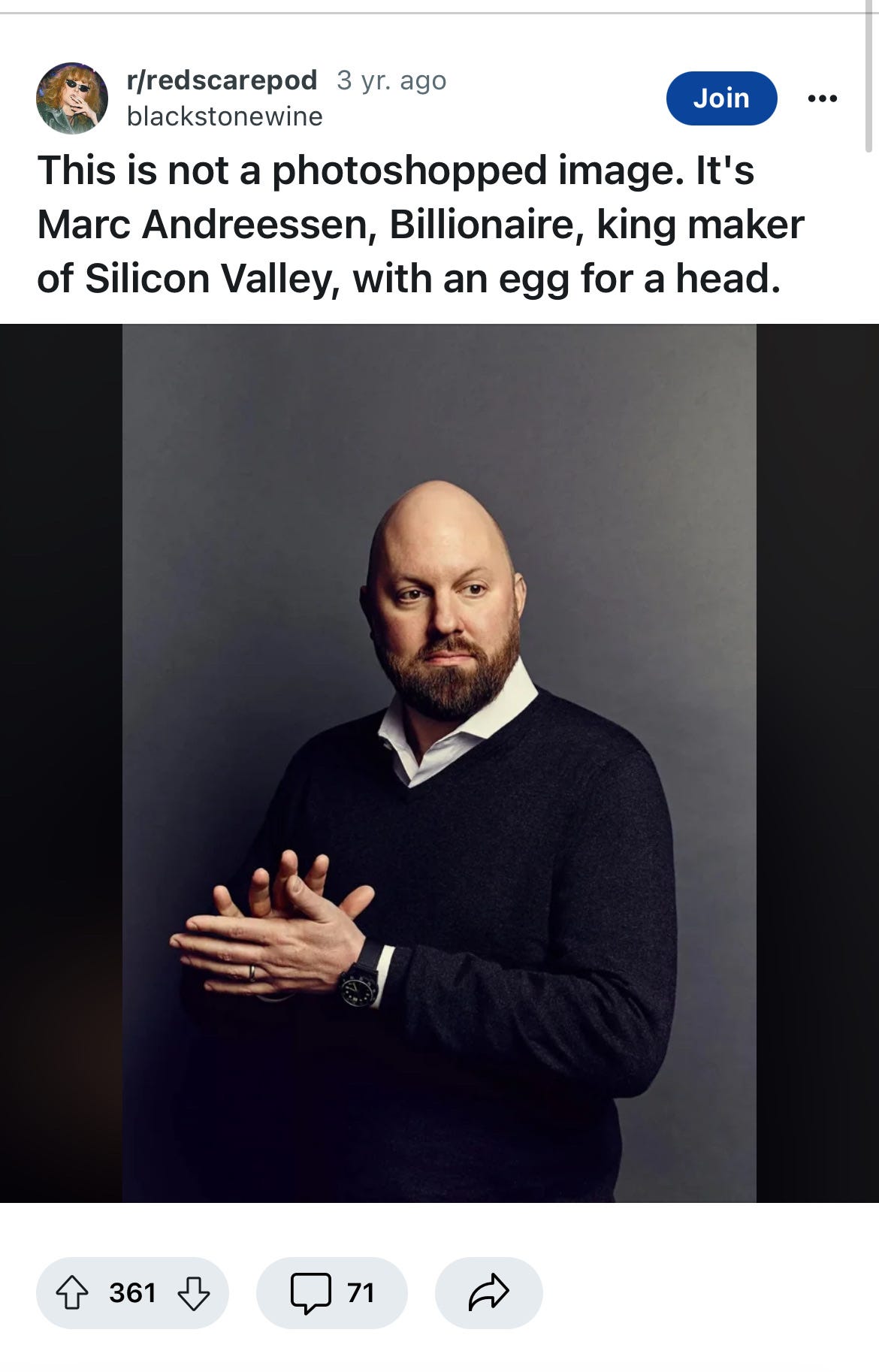
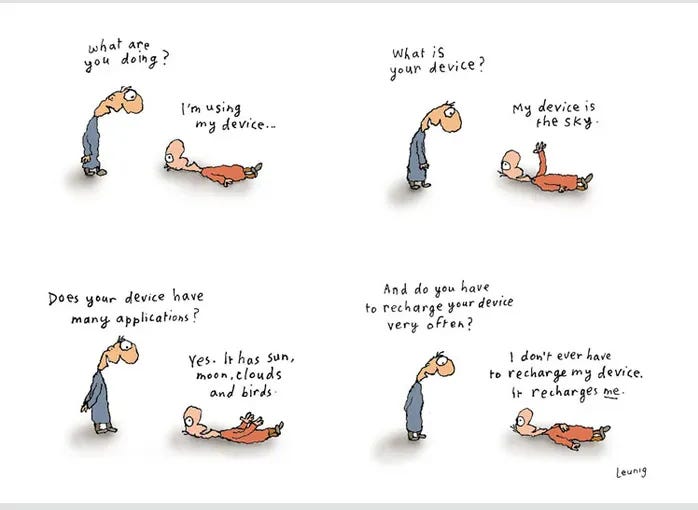




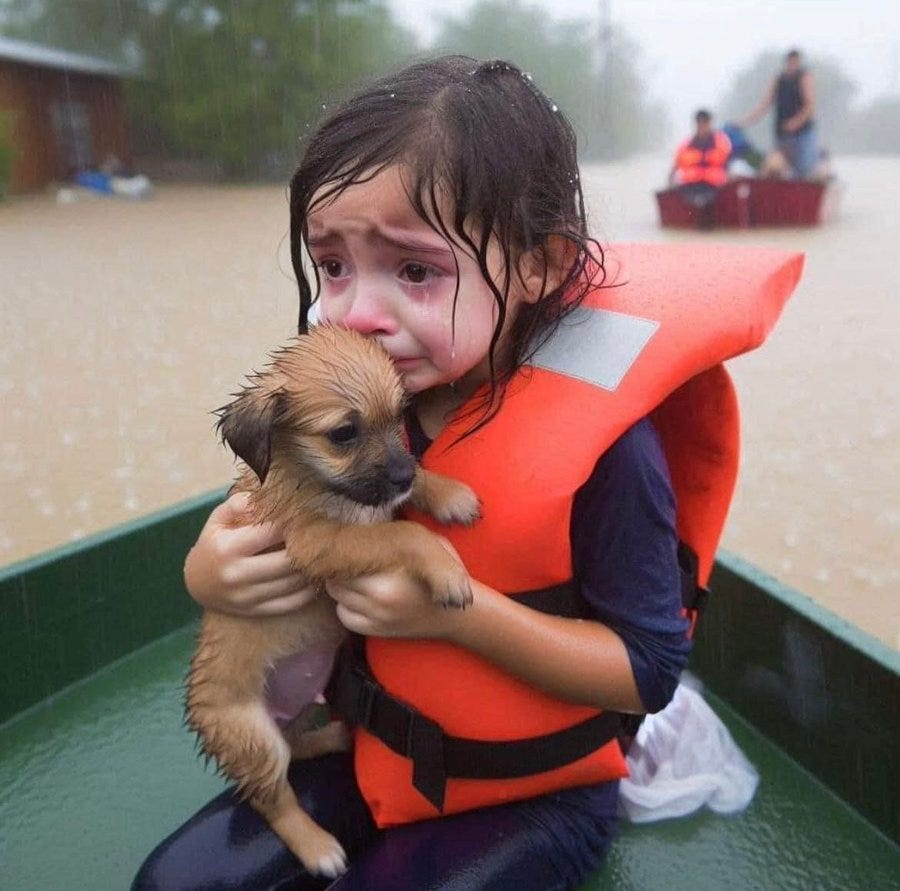

Thanks @inishmannin . I saw a film of Marc before he went fully dark (offline), it was beautiful and moving. He talked about the difficulty of partnership in this context — his then girlfriend didn’t want to live off-grid after being initially enthusiastic. He made a fabulous point that I have often felt in recent years, if you return to the point of origin (nature) and human relationship, does the news with its endless parade of tragedy, groupthink, propaganda and hyperbole even matter? He catalogued the futility of an online post against the relevance of catching a fish. I believe he plays chess once a week with Paul K. doesn’t he? When I come to the green isle, I hope we can all have dinner together!
Thank you Petra. I really appreciated reading this. You express so well why I feel this excruciating pain for a lot of my fellow humans. I don’t think you are gloomy. You know I have a rather “doomer” point of view. Is our only hope catharsis through collapse ? I am an elder privileged who lives on the fringes of society steeped in nature as you know but I keep a thin online link , and my fun thing is to feed wrong data in order to alter my digital twin and bug whatever they try to harvest from me. I am off social media for a long time as well. A friend of mine is now 7 years off grid , totally . I mentioned him a while back ( Mark Boyle ) and his book The Way Home. I will go to see him soon. He is like an island .